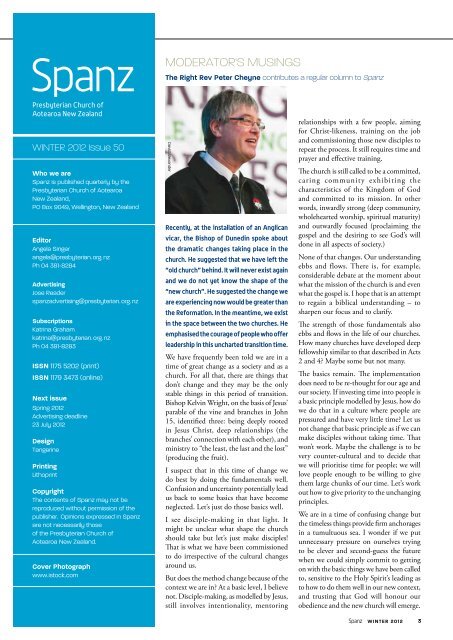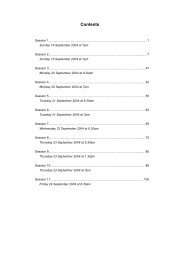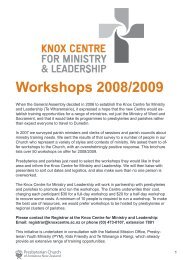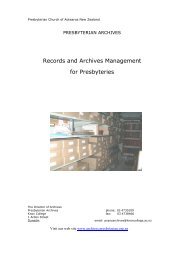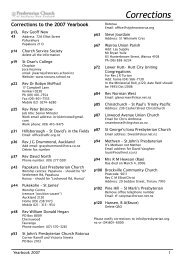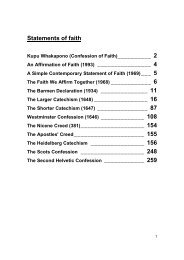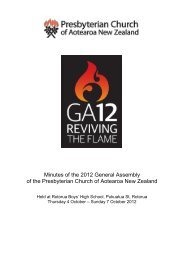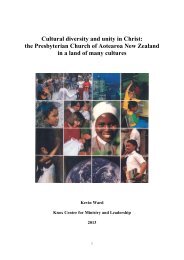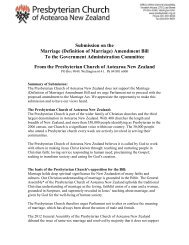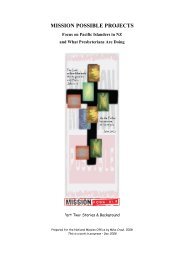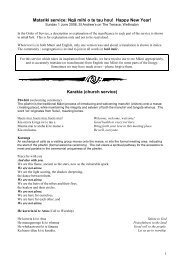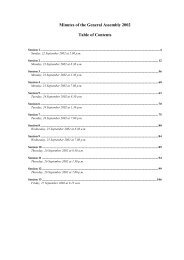Winter edition of Spanz - Presbyterian Church of Aotearoa New ...
Winter edition of Spanz - Presbyterian Church of Aotearoa New ...
Winter edition of Spanz - Presbyterian Church of Aotearoa New ...
Create successful ePaper yourself
Turn your PDF publications into a flip-book with our unique Google optimized e-Paper software.
MODERATOR'S MUSINGS<br />
The Right Rev Peter Cheyne contributes a regular column to <strong>Spanz</strong><br />
<strong>Presbyterian</strong> <strong>Church</strong> <strong>of</strong><br />
<strong>Aotearoa</strong> <strong>New</strong> Zealand<br />
WINTER 2012 Issue 50<br />
Who we are<br />
<strong>Spanz</strong> is published quarterly by the<br />
<strong>Presbyterian</strong> <strong>Church</strong> <strong>of</strong> <strong>Aotearoa</strong><br />
<strong>New</strong> Zealand,<br />
PO Box 9049, Wellington, <strong>New</strong> Zealand<br />
Editor<br />
Angela Singer<br />
angela@presbyterian.org.nz<br />
Ph 04 381-8284<br />
Advertising<br />
Jose Reader<br />
spanzadvertising@presbyterian.org.nz<br />
Subscriptions<br />
Katrina Graham<br />
katrina@presbyterian.org.nz<br />
Ph 04 381-8283<br />
ISSN 1175 5202 (print)<br />
ISSN 1179 3473 (online)<br />
Next issue<br />
Spring 2012<br />
Advertising deadline<br />
23 July 2012<br />
Design<br />
Tangerine<br />
Printing<br />
Lithoprint<br />
Copyright<br />
The contents <strong>of</strong> <strong>Spanz</strong> may not be<br />
reproduced without permission <strong>of</strong> the<br />
publisher.Opinions expressed in <strong>Spanz</strong><br />
are not necessarily those<br />
<strong>of</strong> the <strong>Presbyterian</strong> <strong>Church</strong> <strong>of</strong><br />
<strong>Aotearoa</strong> <strong>New</strong> Zealand.<br />
Cover Photograph<br />
www.istock.com<br />
David Alexander<br />
Recently, at the installation <strong>of</strong> an Anglican<br />
vicar, the Bishop <strong>of</strong> Dunedin spoke about<br />
the dramatic changes taking place in the<br />
church. He suggested that we have left the<br />
“old church” behind. It will never exist again<br />
and we do not yet know the shape <strong>of</strong> the<br />
“new church”. He suggested the change we<br />
are experiencing now would be greater than<br />
the Reformation. In the meantime, we exist<br />
in the space between the two churches. He<br />
emphasised the courage <strong>of</strong> people who <strong>of</strong>fer<br />
leadership in this uncharted transition time.<br />
We have frequently been told we are in a<br />
time <strong>of</strong> great change as a society and as a<br />
church. For all that, there are things that<br />
don’t change and they may be the only<br />
stable things in this period <strong>of</strong> transition.<br />
Bishop Kelvin Wright, on the basis <strong>of</strong> Jesus’<br />
parable <strong>of</strong> the vine and branches in John<br />
15, identified three: being deeply rooted<br />
in Jesus Christ, deep relationships (the<br />
branches’ connection with each other), and<br />
ministry to “the least, the last and the lost”<br />
(producing the fruit).<br />
I suspect that in this time <strong>of</strong> change we<br />
do best by doing the fundamentals well.<br />
Confusion and uncertainty potentially lead<br />
us back to some basics that have become<br />
neglected. Let’s just do those basics well.<br />
I see disciple-making in that light. It<br />
might be unclear what shape the church<br />
should take but let’s just make disciples!<br />
That is what we have been commissioned<br />
to do irrespective <strong>of</strong> the cultural changes<br />
around us.<br />
But does the method change because <strong>of</strong> the<br />
context we are in? At a basic level, I believe<br />
not. Disciple-making, as modelled by Jesus,<br />
still involves intentionality, mentoring<br />
relationships with a few people, aiming<br />
for Christ-likeness, training on the job<br />
and commissioning those new disciples to<br />
repeat the process. It still requires time and<br />
prayer and effective training.<br />
The church is still called to be a committed,<br />
caring community exhibiting the<br />
characteristics <strong>of</strong> the Kingdom <strong>of</strong> God<br />
and committed to its mission. In other<br />
words, inwardly strong (deep community,<br />
wholehearted worship, spiritual maturity)<br />
and outwardly focused (proclaiming the<br />
gospel and the desiring to see God’s will<br />
done in all aspects <strong>of</strong> society.)<br />
None <strong>of</strong> that changes. Our understanding<br />
ebbs and flows. There is, for example,<br />
considerable debate at the moment about<br />
what the mission <strong>of</strong> the church is and even<br />
what the gospel is. I hope that is an attempt<br />
to regain a biblical understanding – to<br />
sharpen our focus and to clarify.<br />
The strength <strong>of</strong> those fundamentals also<br />
ebbs and flows in the life <strong>of</strong> our churches.<br />
How many churches have developed deep<br />
fellowship similar to that described in Acts<br />
2 and 4? Maybe some but not many.<br />
The basics remain. The implementation<br />
does need to be re-thought for our age and<br />
our society. If investing time into people is<br />
a basic principle modelled by Jesus, how do<br />
we do that in a culture where people are<br />
pressured and have very little time? Let us<br />
not change that basic principle as if we can<br />
make disciples without taking time. That<br />
won’t work. Maybe the challenge is to be<br />
very counter-cultural and to decide that<br />
we will prioritise time for people; we will<br />
love people enough to be willing to give<br />
them large chunks <strong>of</strong> our time. Let’s work<br />
out how to give priority to the unchanging<br />
principles.<br />
We are in a time <strong>of</strong> confusing change but<br />
the timeless things provide firm anchorages<br />
in a tumultuous sea. I wonder if we put<br />
unnecessary pressure on ourselves trying<br />
to be clever and second-guess the future<br />
when we could simply commit to getting<br />
on with the basic things we have been called<br />
to, sensitive to the Holy Spirit’s leading as<br />
to how to do them well in our new context,<br />
and trusting that God will honour our<br />
obedience and the new church will emerge.<br />
WINTER 2012<br />
3


